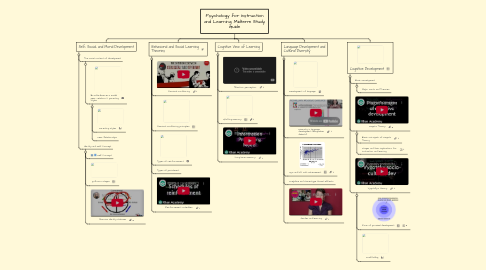Psychology for Instruction and Learning: Midterm Study Guide
par Emily Caldwell


1. Self, Social, and Moral Development
1.1. The social context of development
1.1.1. Bronfenbrenner’s model, peer relations & parenting styles
1.1.1.1. Parenting Styles
1.1.1.2. Peer Relationships
1.2. Identity and Self Concept
1.2.1. Self Concept
1.2.2. Erikson's Stages
1.2.3. Marcia's identity statuses
2. Behavioral and Social Learning Theories
2.1. Classical conditioning.
2.2. Classical conditioning principles.
2.3. Types of reinforcement.
2.4. Types of punishment.
2.5. Reinforcement schedules.
3. Cognitive View of Learning
3.1. Attention, perception.
3.2. Working memory.
3.3. Long-term memory.
4. Language Development and Cultural Diversity
4.1. Development of language.
4.2. Diversity in language development (bilingualism, dialects).
4.3. SES and link with achievement.
4.4. Prejudice and stereotype threat effects.
4.5. Gender and learning.
5. Cognitive Development
5.1. Brain Development
5.1.1. Major Parts and Theories
5.2. Piaget's Theory
5.2.1. Basic Principals of Piaget's Theory
5.2.2. Stages and their implications for instruction and learning
5.3. Vygotsky’s theory
5.3.1. Zone of proximal development
5.3.2. Scaffolding

